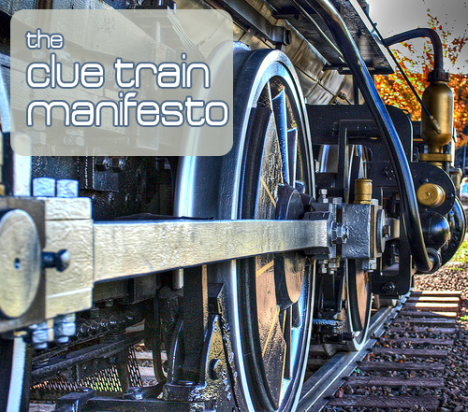
This month marks the 10-year anniversary for what I consider one of the most important manifestos on the Internet. My goal over the next several days is to entice you to read (again or for the first time) The Clue Train Manifesto (free). You can read part one here.
When I first read The Clue Train Manifesto I was young in my marketing career. I first read it during a time when I was trying to tie up the loose theory I learned in college while at the same time seeking something that would help guide my future pursuits. When I first read it, I knew I had found what I was looking for. It was almost a magical moment. Hopefully it will help you as well.
Here are today’s money quotes:
- We long for more connection between what we do for a living and what we genuinely care about, for work that’s more than clock-watching drudgery.
- [C]ompanies don’t like us human. They leverage our longing for their ends. If we feel inadequate, there’s a product that will fill the hole, a bit fetishistic magic that will make us complete. Perhaps a new car would do the trick. Maybe a trip to the Caribbean of that new CD or a nice shiny set of Ginsu steak knives. Anything, everything, just get more stuff. Our role is to consume.
- Because the Net connects people to each other, and impassions and empowers through those connections, the media dream of the Web as another acquiescent mass-consumer market is a figment and a fantasy.
- Markets must come to have faces and personalities in place of statistical profiles.
- The question is whether, as a company, you can afford to have more than an advertising-jingle persona. Can you put yourself out there: say what you think in your own voice, present who you really are, show what you really care about? Do you have any genuine passion to share? Can you deal with such honesty? Such exposure? Human beings are often magnificent in this regard, while companies, frankly, tend to suck. For most large corporations, even considering these questions — and they’re being forced to do so by both Internet and intranet — is about as exciting as the offer of an experimental brain transplant.
- Markets do not want to talk to flacks and hucksters. They want to participate in the conversations going on behind the corporate firewall. De-cloaking, getting personal: We are those markets. We want to talk to you.
Happy Wednesday!
Filed under: Business, Marketing, Social Media | 22 Comments »


 Question: What do you get when you cross the internship of
Question: What do you get when you cross the internship of  Do you remember those “Choose Your Own Adventure” books growing up? The books where you are given choices and the plot unfolds according to direction you take? For example,
Do you remember those “Choose Your Own Adventure” books growing up? The books where you are given choices and the plot unfolds according to direction you take? For example,